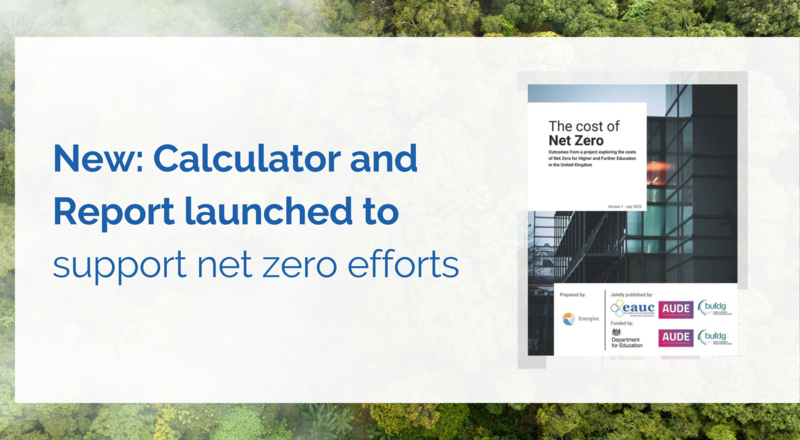Higher/Tertiary Education membership associations AUDE (the Associa...
Higher/Tertiary Education membership associations AUDE (the Association of Higher Education Directors of Estates), BUFDG (the British Universities Finance Directors Group) and the EAUC (the Alliance for Sustainability Leadership in Education) have launched their new Cost of Net Zero Calculator tool, together with a report ‘The Cost of Net Zero’, which sets the new tool in context, and has been delivered by Energise (a sustainability consultancy supporting organisations and sectors to collaboratively address their carbon footprint by providing expertise and tools) with additional funding from the Department for Education.
Higher Education Providers (HEPs) and Further Education colleges that form the membership of these professional bodies, have grappled with one significant question – “What is achieving a net zero carbon state going to cost?”
This is despite the significant focus and activity that has gone into climate change in the sector in recent years. While universities/colleges declared climate emergencies, made significant inroads into specific efforts to adapt – on contractor management, on catering services and food waste, on fleet management, in the curriculum and more, as examples – there was no consistently used and understood means of knowing the likely overall cost of achieving a net zero carbon state for each institution. With no overall estimate of cost, universities and colleges have found it difficult to incorporate long-term sustainability planning into their usual financial and strategic planning mechanisms, never mind actually deliver the host of projects dependent on clear decision-making and sufficient funding.
For members of AUDE, BUFDG and the EAUC, the report makes clear the relative cost level and estimated carbon reduction achievable within each of the three categories of supply chain, built environment and travel/transport, together with specifics on what will need to be done, or how to influence our supply chain partners in delivering change.
Please visit the main Cost of Net Zero page for more information and to download these documents.
Higher Education Providers (HEPs) and Further Education colleges that form the membership of these professional bodies, have grappled with one significant question – “What is achieving a net zero carbon state going to cost?”
This is despite the significant focus and activity that has gone into climate change in the sector in recent years. While universities/colleges declared climate emergencies, made significant inroads into specific efforts to adapt – on contractor management, on catering services and food waste, on fleet management, in the curriculum and more, as examples – there was no consistently used and understood means of knowing the likely overall cost of achieving a net zero carbon state for each institution. With no overall estimate of cost, universities and colleges have found it difficult to incorporate long-term sustainability planning into their usual financial and strategic planning mechanisms, never mind actually deliver the host of projects dependent on clear decision-making and sufficient funding.
For members of AUDE, BUFDG and the EAUC, the report makes clear the relative cost level and estimated carbon reduction achievable within each of the three categories of supply chain, built environment and travel/transport, together with specifics on what will need to be done, or how to influence our supply chain partners in delivering change.
Please visit the main Cost of Net Zero page for more information and to download these documents.











